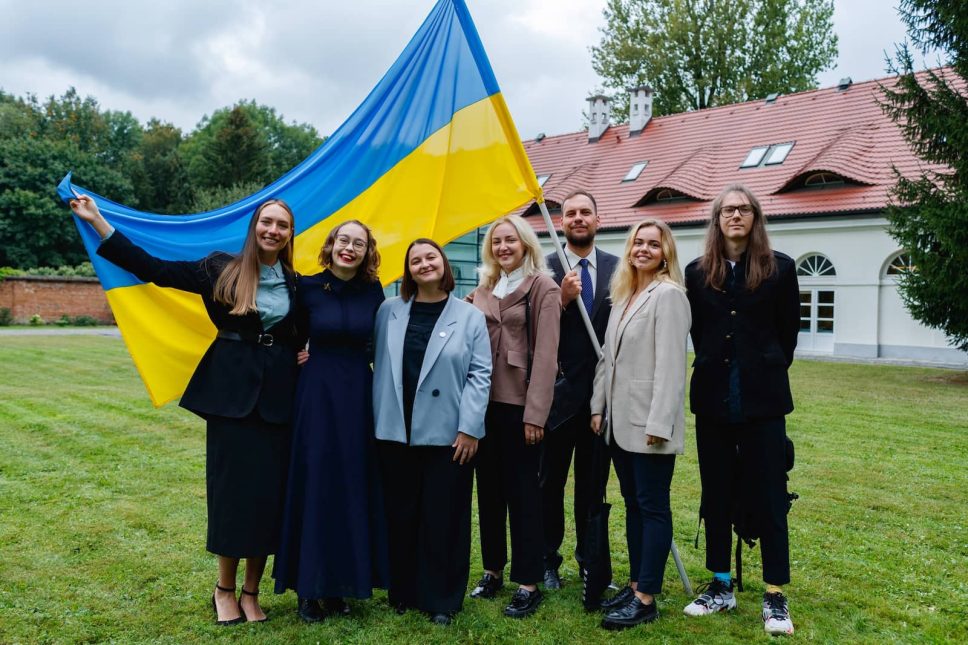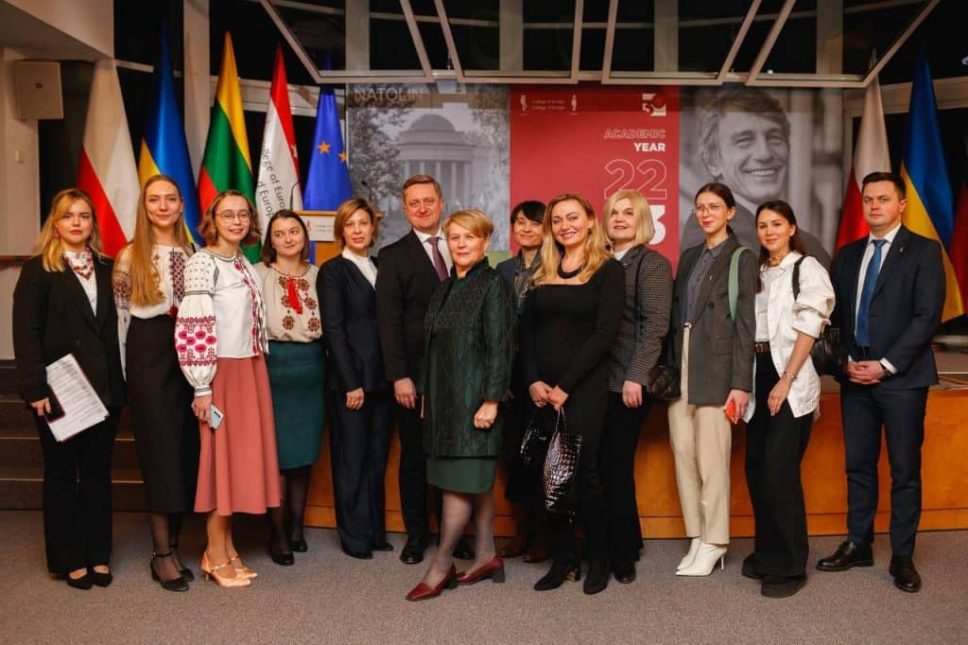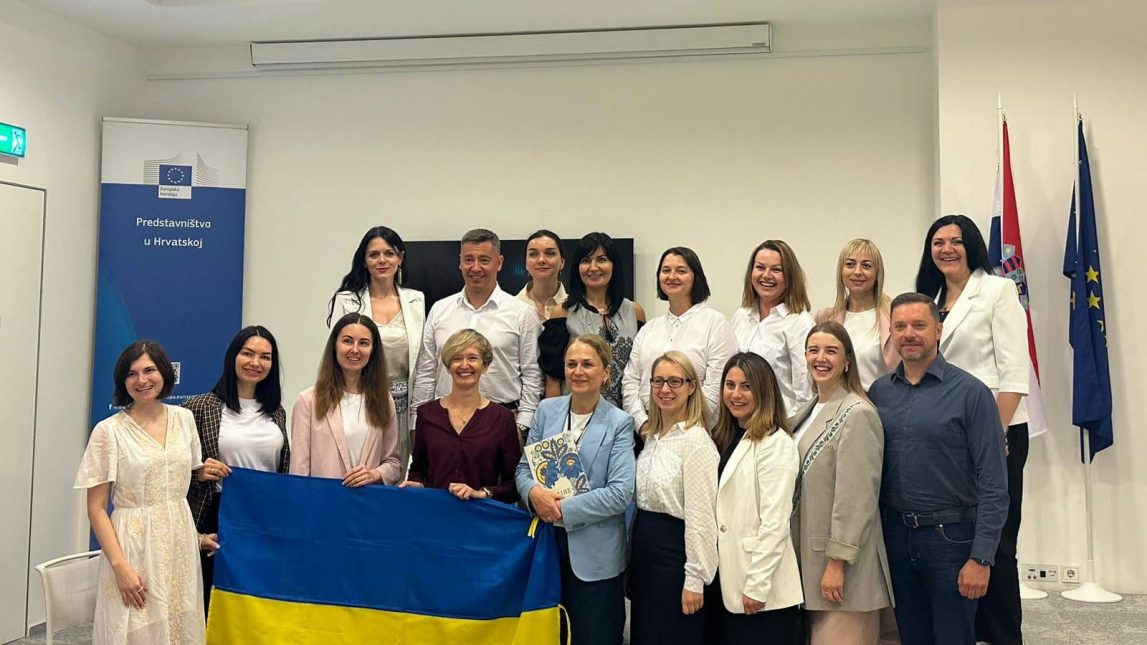
Oleksandra Lysa: a journey of growth, resilience, and transformation at the College of Europe in Natolin
06/11/2024
Before she even set foot on the campus of the College of Europe in Natolin, Oleksandra Lysa had already begun to experience the diverse landscape of international exchange. Growing up in Ukraine, her first taste of global opportunities came through the European Union’s Erasmus+ programme. Living in France for eight months on a volunteering project, she immersed herself in the rhythms of La Ferme du Faï, a space bustling with international work camps, festivals, and a spirit of collective living. Here, Oleksandra discovered her passion for non-governmental work and the potential of grassroots initiatives to create change.
Returning to Ukraine, she channelled this passion into local NGOs, contributing to the non-governmental sector with energy and purpose. But the drive to challenge herself led her to shift gears. After four years in NGOs, she took on a role in Vinnytsia’s city administration, first with the Department of City Marketing and Tourism, and later at the Institute of Urban Development. This blend of public service and community work laid a strong foundation and sparked a growing need for further education and expertise.

One day, the head of her organisation suggested that Oleksandra apply for an EU4Youth scholarship at the College of Europe in Natolin. She accepted the offer, hoping this experience would open new doors and help her professional development.
A new beginning at Natolin
Arriving at the College of Europe in 2022 came with a weight no one could have predicted – the full-scale Russian invasion of Ukraine. With her homeland under attack, Oleksandra faced a dual challenge: embracing academic life while grappling with the turmoil back home. She described her time at the College in one word – it was a ‘challenge’. It wasn’t just about resuming studies after years in the workforce, it was the emotional balancing act of adapting to the demands of academia while processing a personal and national crisis.
But the challenge, for Oleksandra, also meant growth. At Natolin, she was introduced to subjects she had not encountered during her previous education. The diversity of the academic programme, combined with the multilingual, multicultural community, forced her to step outside her comfort zone. For someone who initially did not consider networking to be her strong suit, she quickly realised the importance of mastering this skill for her studies at Natolin and significantly expanded her network of contacts.

“The environment of the College of Europe, which brings together students from the EU, the Eastern Partnership countries, and North Africa, contributes to a significant broadening of the world view and the study of cultures and customs of different countries. In addition, it allows you to quickly improve your communication skills,” Oleksandra said.
The most interesting and useful subjects for Oleksandra were European law and European economics, as well as the subject ‘Ukraine and the EU’. The 10-month study programme allowed her to dive deep into the EU’s decision-making processes and understand the ‘rules of the game’ within the EU.
“If you are interested in European integration or plan to build a career in the EU institutions, studying at Natolin is a very good starting point. In addition, during your studies at Natolin, you will have the opportunity to significantly improve your knowledge of English and French, as well as establish contacts with many specialists from European countries,” Oleksanda said.
Academically, the most significant test came in the form of her master’s thesis. Choosing a topic and writing extensively in English became a source of struggle and pride. Completing the thesis, she said, marked the point of her greatest growth during the programme.
Discovering new directions
The programme’s structure, which allowed her to select subjects and focus areas during the second semester, was transformative. Through these choices, Oleksandra realised her deep interest in economics – an insight that would later shape her career. This new-found focus and the knowledge she gained about EU institutions, trade, and international cooperation set her up for future opportunities.

And the opportunities did come. Soon after graduation, Oleksandra joined the German Agency for International Cooperation (GIZ) on a programme tied directly to the EU-Ukraine Association Agreement. Here, her education at Natolin proved invaluable, and her work is now centred around increasing the competitiveness of small and medium-sized enterprises (SMEs) in Ukraine.
In addition to her role at GIZ, Oleksandra is using her knowledge to educate others, conducting training sessions on EU-related topics with a fellow College of Europe alumnus. Her professional journey is a testament to the power of education in shaping one’s path – and to the role of international cooperation in rebuilding Ukraine.
Looking to the future
As for what lies ahead, Oleksandra remains committed to leveraging her education for the benefit of her country. She knows that the knowledge and skills she gained at Natolin are not just for her career, but for a broader mission – to bring positive change to Ukraine. The EU4Youth scholarship provided her with a world-class education and the clarity and confidence to be a part of her country’s future. In this way, Oleksandra’s journey from Vinnytsia to Natolin is more than a personal achievement – it’s a story of resilience, growth, and the power of education to transform both individuals and nations.
The EU4Youth Phase III Youth Employment and Entrepreneurship programme, funded by the European Union and the Ministry of Foreign Affairs of Lithuania, is implemented by the Central Project Management Agency (CPVA) in the Eastern Partnership countries – Armenia, Azerbaijan, Belarus, Georgia, Moldova, and Ukraine. The programme will run until the middle of 2025 and aims to provide technical assistance to governmental and non-governmental organisations to tackle youth unemployment and improve employability.
Stories
-
Katarina Mathernova: If Ukraine had a human face and a human spirit, it would be 10-year-old Roman Oleksiv
-
A regional mission to drive social entrepreneurship: the story of Ksenia Kosukha
-
EU restores safe water supply for 100,000 Ukrainians affected by war
-
Promoting IT during the war: Lviv IT cluster and how EU4Digital helps
-
Frontline digitalisation: Kharkiv IT Cluster collaborations
-
How EU4Youth is driving opportunity and success among young Ukrainians